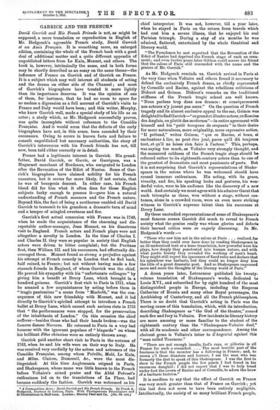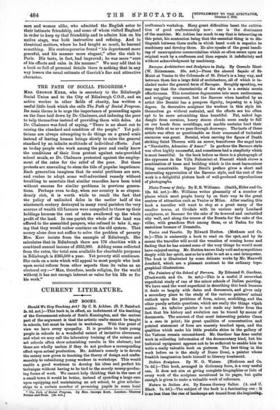GARRICK AND THE FRENCH.* David Garrick and His _French, Friends
is not, as might be supposed, a mere translation or reproduction in English of Mr. Hedgcock's agreeable French study, David Garrick et see Ands Francais. It is something more, an enlarged edition, containing the whole of the French book with a good deal of additional matter and a quite different appendix of unpublished letters from Le Kain, Monnet, and others. The book is, however, intrinsically the same, and in both forms may be shortly described as an essay on the same theme—the influence of France on Garrick and of Garrick on France. It is a subject which may well interest all students of acting and the drama on either side of the Channel ; and most of Garrick's biographers have treated it more lightly than its importance deserves. It was the opinion of one of them, for instance, that he had no room to spare for so useless a digression as a full account of Garrick's visits to France and Italy would have been; and this writer, Murphy, who knew Garrick well, made a special study of his life as an actor ; a study which, as Mr. Hedgcock successfully proves, was quite incomplete without reference to the Corneal() Franeaise. And it would seem that the defects of the early biographers have not, in this sense, been amended by their successors. Owing to errors in known facts and failure to consult unpublished' but necessary authorities, the story of Garrick's intercourse with his French friends has not, till now, been told either correctly or in detail.
France had a legitimate interest in Garrick. His grand- father, David Garrick, or Garric, or Garrigues, was a Huguenot merchant of Bordeaux, who emigrated to London after the Revocation of the Edict of Nantes. Some of G-ar- rick's biographers have claimed nobility for his French ancestors, but it seems far more likely, if not certain, that he was of bourgeois descent. In either case, his French blood did for him what it often does for those English subjects lucky enough to possess it—gave him a natural understanding of French manners and the French nature. Beyond this, the fact of being a southerner enabled old David Garrick to transmit to his grandson a dramatic turn of mind and a temper of mingled sweetness and fire.
Garrick's first actual connexion with France was in 1749, when he made the acquaintance of the charming and dis- reputable author-manager, Jean Monnet, on his disastrous visit to England. French actors and French plays were not altogether a novelty in London. In the time of Charles L and Charles II. they were so popular in society that English actors were driven to bitter complaint ; but the Puritans first, then William III. and his successors, had effectually dis- couraged them. Monnet found so strong a prejudice against his attempt at French comedy in London that he fled back, half ruined, to France; but not without having made a few staunch friends in England, of whom Garrick was the chief. He proved his sympathy with his "unfortunate colleague" by giving him a benefit at Drury Lane, which brought in a hundred guineas. Garrick's first visit to Paris in 1751, when he amazed a few acquaintances by acting before them in " tragic pantomime " a scene from " Macbeth," was the con- sequence of this new friendship with Monnet, and it led directly to Garrick's spirited attempt to introduce a French ballet at Drury Lane, which caused such serious riots in 1755 that " the performances were stopped, for the preservation of the inhabitants of London." On this occasion the chief sufferer—besides those who had their heads broken—was the famous dancer Noverre. He returned to Paris in a very bad humour with the ignorant populace of " blagards " on whom his brilliant Fetes chinoises were so entirely thrown away.
Garrick paid another short visit to Paris in the autumn of 1763, when he and his wife were on their way to Italy. He was received very cordially by the actors and actresses of the Comedie Franeaise, among whom Preville, Mole, Le Kain, and Mlles. Clairon, Dumesnil, &c., were the most dis- tinguished. At this time Anglomania reigned in Paris, and Shakespeare, whose name was little known to the French before Voltaire's mixed praise and the Abbe Prevost's enthusiasm led on to the translations of La Place, had beceme suddenly the fashion. Garrick was welcomed as his
• d Cosmopolitan Actor David Garrick and His French Friends. By Fmnk A. tledgeock, Docteur es Lettres, Paris. With Photogravure Frontispiece and 10 Illustrations in Half-tone. London: Stanley Paul and Co. (10s. 6d. net.)
chief interpreter. It was not, however, till a year later, when he stayed in Paris on the return from travels which had cost him a severe illness, that he enjoyed his real Parisian triumph. During a stay of six months he was
admired, flattered, entertained by the whole theatrical and literary world.
"The Frenchman he met regretted that the Revocation of the Edict of Nantes had deprived the French stage of such an orna- ment; and oven twelve years later Gibbon could assure his friend that the salons of Paris still resounded with the name and the praises of Mr. Garrick."
As Mr. Hedgcock reminds us, Garrick arrived in Paris at the very time when Voltaire and others found it necessary to defend the exclusively French drama, as chiefly represented by Corneille and Racine, against the rebellious criticisms of Diderot and Grimm. Diderot's remarks on the traditional stiffness of the French tragic school are well known.
"Nous parlons trop dans nos drames : et consequemment nos acteurs n'y jouent pas assez." On the question of French tragedy and its almost exclusive appeal to the ear, Grimm was delighted to find Garrick—" ce grand et illustre acteur, ce Roscius des Anglais, ou plutot des moderns"—in entire agreement with himself and his "petit troupeau de croyants" in their desire for more naturalness, more originality, more expressive action.
"Il pretend," writes Grimm, " que ce Racine, si beau, si enchanteur a lire, ne peut etre joue, parce dit toujours tout, et qu'il ne laisse rien faire a l'acteur." This, perhaps, was saying too much, as Voltaire very strongly thought, and
the mannered coldness of the French tragic stage should be referred rather to its eighteenth-century actors than to one of the greatest of dramatists and most passionate of poets. But it is not surprising that Garrick's representations of Shake- speare in the salons where he was welcomed should have
roused immense enthusiasm. His acting, with its grace, vivacity, and fire, his speaking looks and gestures, his won- derful voice, were to his audience like the discovery of a new
world. And certainly we must agree with his admirer Garat that such triumphs as these, won without a stage, without cos- tumes, alone in a crowded room, were an even more striking
witness to Garrick's supreme talent than his successes at Drury Lane.
By these unstudied representations of some of Shakespeare's most famous scenes Garrick did much to reveal to French society what the genius really was whose glories and defects their learned critics were so eagerly discussing. In Mr. Hedgcock's words :-
"Those who saw him act in the salons at Paris . . realized, far better than they could ever have done by reading Shakespeare in an ill-understood text or a lame translation, how powerful were his plays, how deeply they penetrated into human nature, and with what poetic beauty they revealed the working of man's heart. They might still regret his ignorance of fixed rules and declare that his splendour was barbaric, but they could no longer deny him the title of a great dramatic poet. And so Shakespeare engrossed more and more the thoughts of the literary world of Paris."
A dozen years later, Letourneur published his twenty. volume translation of Shakespeare's works, dedicated to Louis XVI., and subscribed for by eight hundred of the most distinguished people in Europe, including the Empress Catherine of Russia and many other Royal personages, the Archbishop of Canterbury, and all the French philosophers. There is no doubt that Garrick's acting in Paris was the moving cause of this translation, which, with its introduction, describing Shakespeare as " the God of the theatre," roused such fire and fury in Voltaire. Few incidents in literary history are more amusing or more familiar to the student of the eighteenth century than the " Shakespeare-Voltaire duel," with all its academic and other correspondence. Among the choicest gems is Voltaire's letter to d'Argental against this "man called Tourneur."
"There are not enough insults, fool's caps, or pillories in all France for such a scoundrel. . . The most terrible part of the business is that the monster has a following in Franco; and, to crown al these disasters and horrors, I am the man who was formerly the first to speak of this Shakespeare. I was the first to show to the French people the few pearls I had found in his enormous dunghill : I did not expect that I was to help tread under foot the crown of Racine and of Corneille, to adorn the brow of a barbaric histrion."
It is needless to say that the effect of Garrick on France was very much greater than that of France on Garrick ; yet this last does not seem to have been entirely negligible.
Intellectually, the society of so many brilliant French people, men and women alike, who admitted the English actor to their intimate friendship, and some of whom visited England in order to keep up that friendship and to admire him on his native stage, was both instructive and refining. And in theatrical matters, where he had taught so much, he learned something. His contemporaries found " his deportment more graceful, and his manner more elegant," after the visit to Paris. His taste, in fact, had improved; he was more " sure of his effects and calm in his manner." We may add that in a book so full of personal details there is nothing that in any way lowers the usual estimate of Garrick's fine and attractive character.



































































 Previous page
Previous page